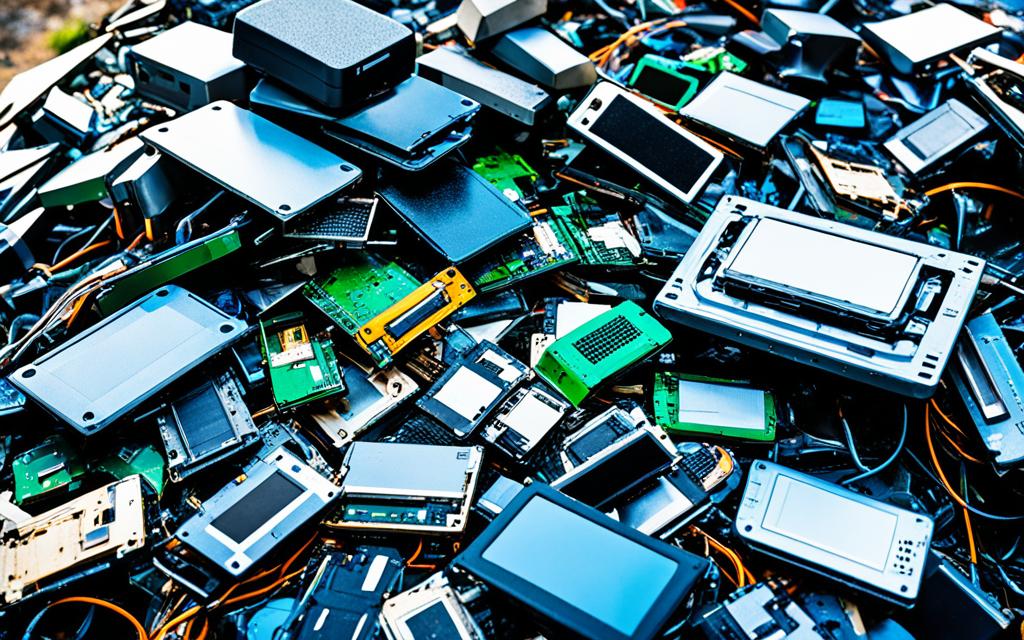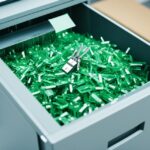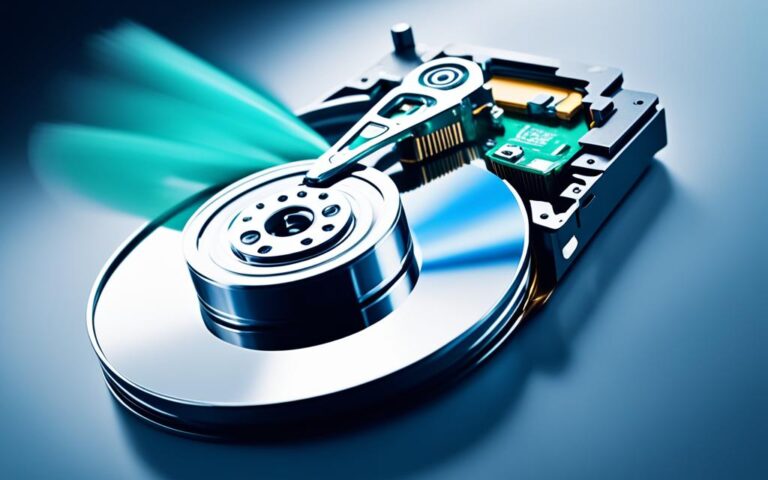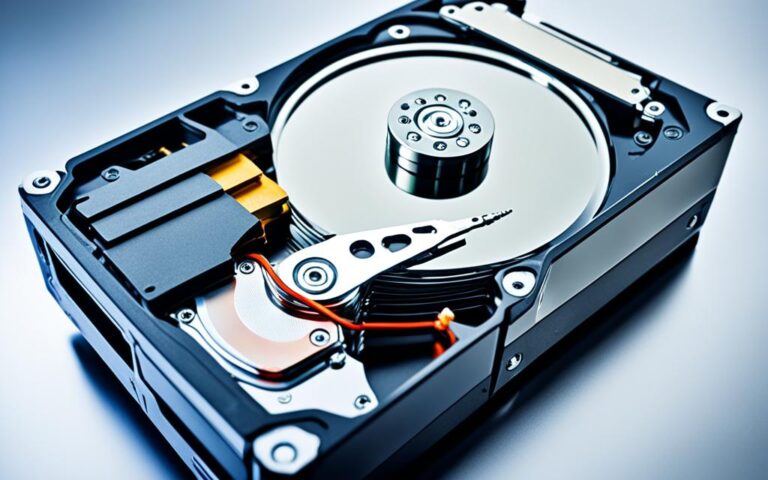Ensuring the Secure Destruction of Data in Consumer Electronics Recycling
The improper disposal of consumer electronics can lead to data breaches and privacy incidents, which can damage a company’s reputation and erode customer trust. It is important to ensure the secure destruction of data in the recycling process to protect sensitive information. Violations of data disposal regulations can result in significant fines. Certified data destruction involves securely and irreversibly erasing data from electronic devices, eliminating the risk of unauthorized access or retrieval. This process should be carried out by trained professionals who follow industry best practices and adhere to specific standards and certifications. Shredding is the preferred method for destroying e-waste, as it effectively destroys the components and allows for valuable materials to be recovered through recycling. Working with a certified ITAD provider ensures proper data destruction and compliance with regulations.
The Cost of Disposing of e-Waste Incorrectly
The improper disposal of e-waste can have severe consequences, including data disposal violations and hefty fines. Organizations and businesses must adhere to the Disposal Rule, which mandates the proper removal of personally identifiable information from digital devices and secure disposal of paperwork. Failure to comply with this rule can result in fines of up to $3,500 per violation. In addition, industries subject to privacy rules like the Gramm-Leach-Bliley Safeguard Rule and HIPAA may face even higher penalties for mishandled e-waste.
Several notable cases highlight the financial repercussions of improper disposal. For instance, Morgan Stanley was fined a staggering $60 million after improper disposal led to a breach, while a Florida news station encountered sensitive information on second-hand computers. These examples demonstrate the significant financial risks associated with mistreating e-waste.
To avoid these costly consequences, businesses must handle e-waste responsibly and prioritize secure disposal practices. Such measures protect sensitive data, prevent regulatory violations, and safeguard both the company’s reputation and its clients’ trust.
“Improper disposal of e-waste can have severe consequences, including data disposal violations and hefty fines.”
The following table illustrates notable fines imposed on companies for improper disposal:
| Company | Fine Amount |
|---|---|
| Morgan Stanley | $60 million |
| Florida news station | Not disclosed |
As the table shows, the financial penalties for data disposal violations can be substantial. Investing in proper e-waste disposal safeguards a company against legal repercussions and potential financial losses.
Ensuring Data Destruction Measures
To ensure the secure destruction of data, it is vital to work with ITAD professionals who possess the expertise and tools for secure data destruction. Restoring a device to factory settings is not sufficient to permanently erase the data. Instead, various data erasure techniques can be employed, such as degaussing and software wiping. However, the most secure option for data destruction is shredding e-waste.
Shredding involves physically breaking down electronic devices into small pieces, guaranteeing the complete destruction of data. This method ensures that no trace of sensitive information remains, providing businesses with peace of mind.
When it comes to secure data destruction, it is recommended to partner with an ITAD provider that offers professional services and holds industry certifications, such as NAID (National Association for Information Destruction) and e-Stewards. By choosing a certified provider, businesses can be confident that data disposal regulations are complied with and receive a certificate of destruction as proof.
| Data Erasure Techniques | Level of Security |
|---|---|
| Degaussing | High |
| Software Wiping | Moderate |
| Shredding | Highest |
Working with ITAD professionals who specialize in secure data destruction ensures that businesses can adhere to regulatory requirements and protect their sensitive information effectively.
The Environmental Impact of Improper Electronics Disposal
Improper disposal of electronic devices contributes to the growing global issue of e-waste. Discarded electronics contain hazardous materials such as lead, mercury, cadmium, and flame retardants. When not properly recycled, these materials can pose significant environmental risks, as they can leach into the soil and water, contaminating the environment.
Recycling electronic devices allows for the recovery of valuable materials like aluminum, copper, glass, plastic, and steel. These materials can be reused in various industries, reducing the need for new resource extraction. By recycling electronic devices, we can minimize the environmental impact of e-waste and promote a more sustainable approach to waste management.
The Environmental Risks of Improper Electronics Disposal
Improper disposal of electronic devices can have severe environmental consequences. These devices often end up in landfills or incinerators, where their hazardous materials can contaminate the air, soil, and water. The toxic substances found in electronics can seep into groundwater, affecting local ecosystems and posing health risks to humans and wildlife.
“E-waste contains toxic substances that can cause environmental pollution and harm to human health if not handled properly.” – United Nations Environment Programme
Furthermore, the extraction of raw materials to manufacture new electronic devices contributes to deforestation, habitat destruction, and increased carbon emissions. By recycling electronic devices and extracting valuable materials from them, we can reduce the demand for new resources, conserve energy, and mitigate the negative environmental impact of manufacturing new devices.
The Benefits of Recycling Electronic Devices
Recycling electronic devices offers several environmental benefits:
- Reduces the need for new resource extraction
- Conserves energy
- Prevents the release of greenhouse gases
- Minimizes water pollution
- Protects natural habitats from destruction
By recycling electronic devices, we can recover valuable materials that can be used in the manufacturing of new products. This reduces the reliance on raw materials and conserves natural resources. It also decreases the release of greenhouse gases associated with the extraction and production processes.
| Material | Recovery Benefits |
|---|---|
| Aluminum | Conserves energy, reduces water pollution, prevents habitat destruction |
| Copper | Reduces the need for new mining, lowers carbon emissions |
| Glass | Decreases the demand for raw materials, saves energy |
| Plastic | Reduces waste, conserves natural resources |
| Steel | Protects forests, reduces CO2 emissions |
Recycling electronic devices not only helps mitigate the environmental risks associated with e-waste but also contributes to a more sustainable and circular economy. By reusing and repurposing valuable materials, we can reduce waste, conserve resources, and minimize the carbon footprint of the electronics industry.
Proper Recycling Through Certified IT Recycling Providers
To address the environmental impact of e-waste and ensure proper recycling, businesses should collaborate with certified IT recycling providers. These providers have the expertise and infrastructure to handle electronic devices in an environmentally responsible manner.
“Collaborating with certified IT recycling providers ensures that electronic devices are recycled in compliance with environmental regulations and industry standards.” – Environmental Protection Agency
By partnering with certified recyclers, businesses can ensure that their electronic devices are processed using safe and environmentally friendly methods. Certified providers adhere to strict waste management protocols, including the proper handling and disposal of hazardous materials. They also ensure that valuable materials are recovered and reused, reducing the demand for new resources.
Proper electronics recycling not only safeguards the environment but also enables businesses to demonstrate their commitment to sustainability and corporate social responsibility. By choosing the right recycling partners, we can protect the planet and contribute to a greener future.
Responsible Disposal Options for Consumer Electronics
When it comes to disposing of consumer electronics responsibly, there are several options available. Leading IT manufacturers have implemented recycling schemes, allowing consumers to return their equipment for proper disposal and recycling. Specialist IT recycling companies also offer services for secure data wiping and compliant disposal of electronic devices. These companies adhere to the Waste Electrical and Electronic Equipment (WEEE) legislation and hold Waste Carriers Licenses, ensuring responsible handling of e-waste.
Another alternative is to donate unwanted electronics to non-profit organizations that collect IT equipment for reuse or proper recycling. By donating to these organizations, you not only support community groups or developing countries but also contribute to the circular economy.
Before donating, it is crucial to securely dispose of all data on the devices to protect your personal information. Mobile phones, in particular, can be recycled through various companies that offer cash in return for old devices.
When choosing an option for secure data removal and disposal, it is essential to select reputable and GDPR-compliant services. This ensures that your data is effectively erased and disposed of while maintaining compliance with data protection regulations.
To summarize, responsible disposal options for consumer electronics include:
- Returning equipment through manufacturer recycling schemes
- Using specialist IT recycling companies for secure data wiping and disposal
- Donating to non-profit organizations for reuse or proper recycling
- Recycling mobile phones through companies that offer cash in return
By choosing one of these options, you can ensure your old electronics are disposed of properly and contribute to a more sustainable and responsible approach to electronic waste management.
| Disposal Option | Advantages | Considerations |
|---|---|---|
| Manufacturer Recycling Schemes | – Convenient and widely available – Proper recycling and disposal – Support from trusted brands |
– Limited to specific manufacturers – May not cover all types of electronics – Compliance with data removal regulations |
| Specialist IT Recycling Companies | – Secure data wiping – Compliance with regulations – Expertise in handling e-waste |
– Cost of services – Choosing a reputable provider – Verification of certifications |
| Donating to Non-profit Organizations | – Supporting community groups or developing countries – Contributing to the circular economy – Reuse of electronic devices |
– Verification of organization’s practices – Data security during donation process – Compatibility of donated devices |
| Recycling Mobile Phones for Cash | – Financial incentive for recycling – Responsible disposal of mobile phones – Recovery of valuable materials |
– Data removal before recycling – Verification of responsible recycling practices – Meeting requirements of cash-for-recycling companies |
Conclusion
Ensuring the secure destruction of data in consumer electronics recycling is essential to protect sensitive information and maintain regulatory compliance. Improper disposal of electronic devices can result in data breaches, reputational damage, and significant fines. By working with certified ITAD professionals and following industry best practices, businesses can effectively destroy data and mitigate these risks.
Proper disposal of electronic devices also contributes to environmental sustainability by reducing e-waste and enabling the recovery of valuable materials. Recycling electronic devices through reputable and certified providers ensures responsible disposal and supports the circular economy. By prioritising secure data destruction and environmental sustainability in consumer electronics recycling, businesses can protect their sensitive information and contribute to a more sustainable future.
Overall, the proper disposal of electronic devices through certified ITAD professionals is crucial in protecting sensitive data, complying with regulations, and minimizing environmental impact. By partnering with reputable providers, businesses can safeguard their sensitive information and participate in sustainable practices that benefit both their bottom line and the planet.
FAQ
Why is secure data destruction important in consumer electronics recycling?
Secure data destruction is important in consumer electronics recycling to protect sensitive information and prevent data breaches and privacy incidents. It ensures that data is irreversibly erased from electronic devices, eliminating the risk of unauthorized access or retrieval.
What are the consequences of improper disposal of e-waste?
Improper disposal of e-waste can result in violations of data disposal regulations, leading to significant fines. Violations of the Disposal Rule can result in fines of up to ,500 per violation, and additional privacy rules can lead to even higher fines. Improper disposal can also damage a company’s reputation and erode customer trust.
How can data destruction be effectively ensured?
To ensure data is effectively destroyed, it is important to work with ITAD professionals who have the expertise and tools for secure data destruction. Simply restoring a device to factory settings is not enough. Shredding e-waste is considered the most secure option, as it physically breaks down electronic devices into small pieces, ensuring complete destruction of the data.
What is the environmental impact of improper electronics disposal?
Improper electronics disposal contributes to the growing global issue of e-waste. Discarded electronics contain hazardous materials that can leach into the environment and pose significant risks to soil and water contamination. Proper recycling of electronic devices allows for the recovery of valuable materials and reduces the need for new resource extraction.
What are the responsible disposal options for consumer electronics?
There are several responsible disposal options for consumer electronics. Many leading IT manufacturers have recycling schemes in place, allowing consumers to return their equipment for proper disposal. Specialist IT recycling companies also offer services for secure data wiping and compliant disposal of electronic devices. Non-profit organizations collect IT equipment for reuse or proper recycling. It is important to choose reputable and GDPR-compliant options for secure data removal and disposal.















